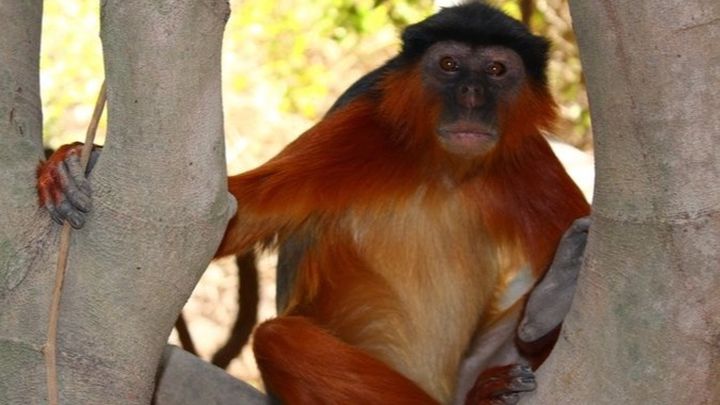
Revive the Monkey Park
In April 2018, a document went viral in which a governmental order was given to de-reserve the Bijilo Forest Park (also known as the Monkey Park), allowing its complete destruction to make way for presidential villas, a hotel resort, and a shopping mall. This was following a destruction of 7 hectares in 2017, to construct a conference center.
Through great efforts from environmentalists like Green Up Gambia, and a petition signed by thousands of concerned people, the remaining Monkey Park has been saved from this destruction, and is now officially reserved again.
We want to thank everyone who voiced out and supported this process!
However, the story does not end here. Wildlife of the park, including the endangered Western Red Colobus Monkey, are struggling to find water and food.
The park does not have any naturally occuring springs, it used to rely on a small pool set up by the birdwatchers, which was damaged in the deforestation of the 7 hectares. The destroyed area was also rich in wild fruit trees, and therefore a main feeding ground for the monkeys. In desperation, the monkeys now leave the park to go scavenging in hotel grounds and residential areas. Many get hit by cars when crossing the highway in this undertaking...
Together with Green Up Gambia, we have already managed to restore a water pool which was previously neglected and disconnected. It is temporarily supplied
with water from the neighbouring WALIC (former ITC) compound.
But this is only a temporary, quick-fix solution. What the park really needs are ponds with boreholes, to make it independent from their neighbour’s supply. This project has been discussed with the park management, and an MOU has been signed by the Ministry of Environment, that lets us go ahead.
Our aims are therefore the following:
1. To make a borehole with a pond and a manual pump. We have received a cost estimate of about 1,600 Euro (£1,400).
2. Make a second borehole with pond in a different area of the park, as the monkey groups have different territories, making it hard for all to access the same pond. This would cost another 1,600 Euro (£1,400).
3. Contributing to the reforestation of the area which had already been bulldozed. Trees in this area were the main feeding grounds of the monkeys, so we would like to replant mainly wild fruit trees.
4. Any extra funds raised would contribute to the fencing of the park. This will be crucial to protect the park from illegal logging, rubbish dumping, and domestic animals such as stray dogs and grazing cattle.
A sincere, big THANK YOU in advance for your help and support. Every donation, no matter how small, will help us revive the Monkey Park, to ensure that it continues to be a key tourist attraction and stunning ecosystem for the generations to come!
Through great efforts from environmentalists like Green Up Gambia, and a petition signed by thousands of concerned people, the remaining Monkey Park has been saved from this destruction, and is now officially reserved again.
We want to thank everyone who voiced out and supported this process!
However, the story does not end here. Wildlife of the park, including the endangered Western Red Colobus Monkey, are struggling to find water and food.
The park does not have any naturally occuring springs, it used to rely on a small pool set up by the birdwatchers, which was damaged in the deforestation of the 7 hectares. The destroyed area was also rich in wild fruit trees, and therefore a main feeding ground for the monkeys. In desperation, the monkeys now leave the park to go scavenging in hotel grounds and residential areas. Many get hit by cars when crossing the highway in this undertaking...
Together with Green Up Gambia, we have already managed to restore a water pool which was previously neglected and disconnected. It is temporarily supplied
with water from the neighbouring WALIC (former ITC) compound.
But this is only a temporary, quick-fix solution. What the park really needs are ponds with boreholes, to make it independent from their neighbour’s supply. This project has been discussed with the park management, and an MOU has been signed by the Ministry of Environment, that lets us go ahead.
Our aims are therefore the following:
1. To make a borehole with a pond and a manual pump. We have received a cost estimate of about 1,600 Euro (£1,400).
2. Make a second borehole with pond in a different area of the park, as the monkey groups have different territories, making it hard for all to access the same pond. This would cost another 1,600 Euro (£1,400).
3. Contributing to the reforestation of the area which had already been bulldozed. Trees in this area were the main feeding grounds of the monkeys, so we would like to replant mainly wild fruit trees.
4. Any extra funds raised would contribute to the fencing of the park. This will be crucial to protect the park from illegal logging, rubbish dumping, and domestic animals such as stray dogs and grazing cattle.
A sincere, big THANK YOU in advance for your help and support. Every donation, no matter how small, will help us revive the Monkey Park, to ensure that it continues to be a key tourist attraction and stunning ecosystem for the generations to come!
Organizer and beneficiary
Anne Braren
Beneficiary